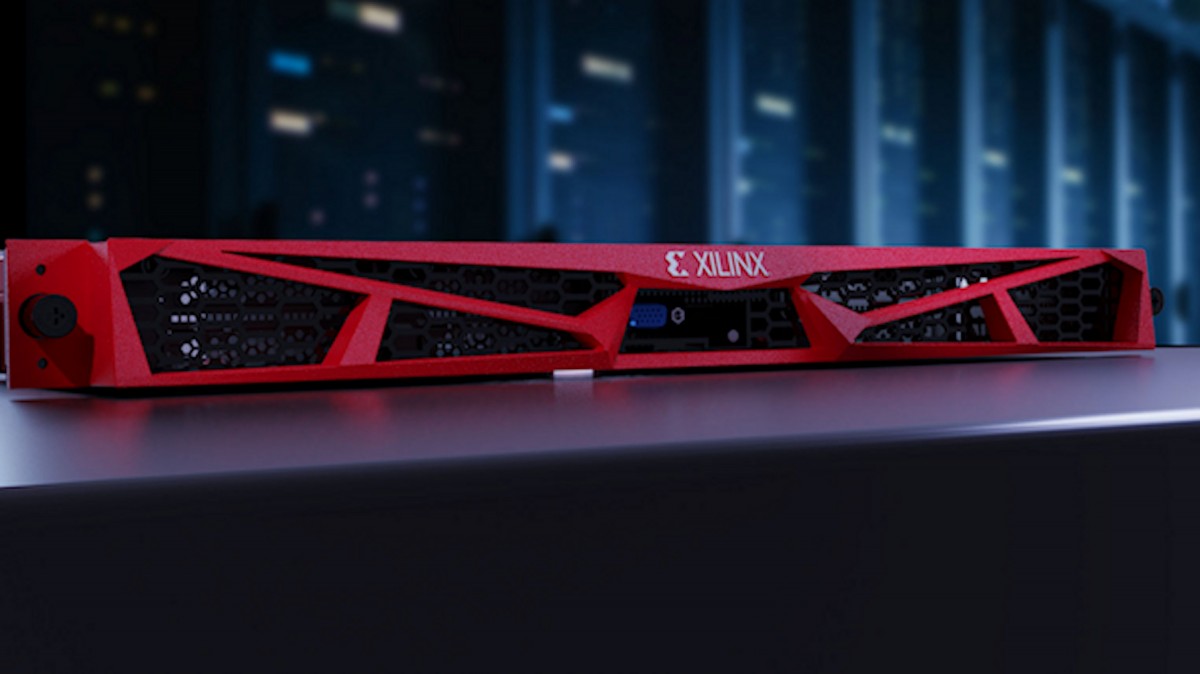Xilinx has introduced two real-time computing video appliances for easy-to-scale, ultra-high-density video transcoding applications. Based on the new
Xilinx® Real-Time (RT) Server reference architecture, these new appliances will enable service providers delivering applications such as eSports and game streaming platforms, social and video conferencing, live distance learning, telemedicine and live broadcast video to
optimize video quality and bitrate at the lowest cost per channel for significant TCO savings over both software-based and fixed-architecture approaches.
Designed for edge and on-premise compute-intensive workloads where video channel density, throughput and latency are critical requirements, the new Xilinx Real-Time Video Appliances feature optimized hardware architectures and software to deliver the industry’s highest channel density and lowest latency performance. The appliances are available in two pre-configured options integrating Xilinx® Alveo™ data center accelerator cards – the High Channel Density Video Appliance and the Ultra-Low Bitrate Video Appliance.
“As the volume of video streaming increases exponentially, optimized architectures are becoming critical,” said Donna Yasay, vice president of marketing, Data Center Group, at Xilinx. “We’re all experiencing this today in the current COVID-19 remote work, learn and play environment -- the massive increase in concurrent channel usage is taxing service provider business models and driving up bandwidth costs. With these new reference architectures, Xilinx is enabling solution providers to maximize cost savings, while delivering high-quality video streaming services.”
Optimized for Video Transcoding
Developed to deliver the lowest cost per channel, the High Channel Density Video Appliance integrates up to eight Alveo U30 data center acceleration cards, also launching today. The new Alveo U30 card addresses the need for high-density video processing in a low-profile form factor accelerator card. The Alveo U30 card is powered by the Zynq® UltraScale+™ MPSoC, a power-optimized all-programmable system-on-chip (SoC) with integrated video codec and graphics engines for ultra-high-definition video. The U30 card supports both the H.264 and HEVC (H.265) codecs and is capable of streaming up to sixteen 1080p30 channels per card.
The Ultra-Low Bitrate Optimized Video Appliance is purpose-built for high-quality live video while reducing bandwidth costs. It contains up to eight Alveo U50 accelerator cards. Built on Xilinx® UltraScale+™ architecture and packaged in an efficient 75-watt, low-profile form factor, the Alveo U50 card includes 8GB HBM2, 100GbE networking and a PCI Express® 4.0 interconnect. It is capable of streaming up to seven full-HD 1080p60 channels along with eight full ABR ladders (all at x265 medium preset).
These new appliances are built on the FFmpeg framework to allow for rapid replacement of existing software and GPGPU-based transcoder infrastructure by providing system developers with a common API. Software partners are engaged to build applications to run above the standard FFmpeg layer. The HEVC codec is rebuilt from the ground up in a componentized manner to allow for better control of the codec down to the frame level. This allows system integrators to adjust rate control and fine-tune other parameters to optimize video quality and bitrate to suit the particular end application. This unique flexibility offered by adaptive compute devices is not possible with ASIC-based options. Both appliances offer up to a 4x reduction in cost, footprint, and power for H.264 at 1080p30 resolution and x264 medium preset.
The Xilinx RT Server reference architectures are built with optimized hardware architectures and software stacks, from the gate-level up to the software and AI stacks, to maximize performance for specific workloads. Available in a 1RU rackmount form factor, both appliances support complete Docker container and Kubernetes management capability to enable easy scale-out deployments.
HPE ProLiant server qualifications and ISV support
HPE has qualified the Alveo U50 and Alveo U250 accelerator cards on the HPE ProLiant servers. The HPE ProLiant DL380 Gen 10 and HPE ProLiant DL385 Gen 10 Plus servers will be the first Xilinx FPGA-powered HPE servers. HPE will be the first tier one server OEM to offer the bitrate optimized Alveo U50-based video transcoding appliance. The qualification of Alveo cards on HPE servers adds to a growing list of OEM server partners and ISV applications published on the Alveo platform for accelerating cloud and on-premise workloads.
“Today’s compute-intense workloads are driving the demand for differentiated video transcoding, video analytics and database acceleration solutions,” said Michael Mangiafico, Compute Accelerator Strategist, HPC and MCS, at HPE. “By collaborating with Xilinx to offer Alveo accelerator-supported products in HPE ProLiant servers that are high-performing and versatile, we are enabling a market-ready solution to power a range of capabilities for emerging live-streaming applications.”
Xilinx value added resellers are integrating the Wowza Streaming Engine™ media server into RT Server-based appliances. This web-based GUI application lets users manage live streaming video in an easy and intuitive way. Integration is expected to be complete and available in the third quarter of this year.
“Wowza is working closely with Xilinx and its VARs to integrate the Wowza Streaming Engine media server into RT Server-based appliances. This integration will in the future offer a complete solution for cost-effective and easy management of live video streaming,” said Anthony Lazaro, senior director of product, at Wowza.




